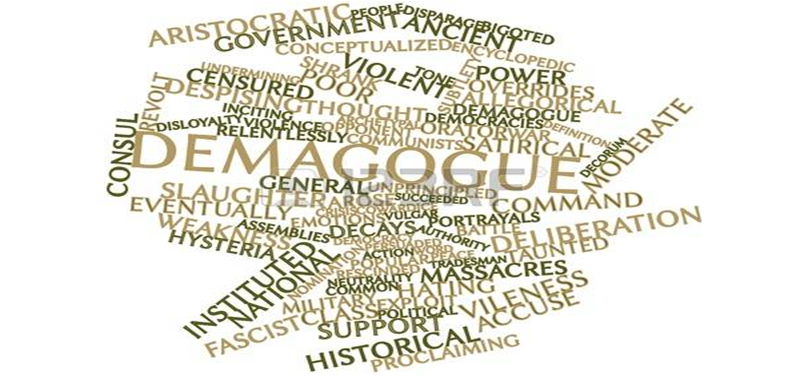The Demagogue And The Rhetoric of Demagoguery
LONDON: The rise of the far right in America, Europe and Asia is a powerful phenomenon of recent times.
The United States elections in November 2016, and the referendum on Britain’s future as a member of the European Union in June that year, were momentous events with life-changing implications for vast numbers of people.
In each case, extreme language and extraordinary claims shaped the campaign and its outcome. They radicalised popular views and expectations which might last.
Leaders who resort to this type of rhetoric are often described as populist in journalism and normal discourse. However, populist is not a satisfactory term given the context. Closeness to popular gives the term populist a favourable meaning.
Instead, demagogue is a more fitting term, and the type of rhetoric used by such a leader is demagoguery.
A list of demagogues through history would be long even if such a complex exercise were attempted. The history of demagoguery, which appeals to emotions and prejudices rather than reasonable arguments, is old. It goes back two and a half thousand years, when the comic playwright Aristophanes of ancient Athens wrote about Cleon the demagogue – a reckless mob-orator trading upon popular passions to advance his own interests.
The Columbia University professor Reinhard Luthin, in his book American Demagogues (Beacon, 1954), defines the term demagogue as a politician skilled in oratory, flattery and invective, evasive in discussing vital issues, appealing to the passions rather than the reason of the public, and arousing racial, religious and class prejudices in order to become a master of the masses.
For a demagogue to arise, particular conditions must exist. There has to be a perception of a weak and corrupt government. One group believes that unfair advantages are going to another group, usually but not always a minority, which is claimed to be at the root of wider problems in society. The in-group is seen as disadvantaged or loser – the out-group the beneficiary.
Accusations, often sweeping and libellous, that the entire community of “others” is disloyal to the country are made. It is a state of nostalgia of ethnic, cultural or religious superiority.
These conditions make a cocktail of social tension and conflict which powerful groups thrive on. They may cause low-level violence and sustained economic warfare in which the dominant group aims to capture a greater share of society’s wealth and more privileges. This trend may trigger retaliation by some in weaker groups.
At the extreme, members of the stronger group may envision a fully homogeneous society without there being other groups. Mild suggestions or direct threats may be issued against weak and vulnerable communities. Uncertainty and upheaval follow. The result is a steady decline in the productive and defensive capacity of the afflicted society.
The state of mind which interprets things in such black and white terms is called naïve realism – a belief that the world is exactly as an individual’s mental image of it. Personal viewpoint, bias, education and training make little or no difference. Problems have simple explanations. The lesser the interpretation, the purer the conclusion.
The work of Professor Patricia Roberts Miller of the University of Texas suggests that naïve realism reinforces a group’s faith in its own purity, and refutes any possibility that the group may be wrong. Dead certainty is a strong characteristic of the demagogue. They are always prone to authoritarianism and bigotry, and their reasoning goes backwards to maintain hierarchies.
Judgments are deduced from “traditional practices, values and beliefs”; from “traditional” interpretations of “authoritative” texts; from reasoning backwards from what must be true to maintain current hierarchies – whether they are religious, cultural, gender or national.
Empirical evidence is not important for the demagogue. The central point of reasoning is what “must” or “should” happen if certain premises are correct, and those premises are protected from falsification. Evidence which might falsify the demagogue’s premises is rejected outright.
Identity is fundamental to demagogues and their rhetoric. Their assumption is that people of a particular identity in a society are better, and entitled to more goods regardless of their behaviour. So members of the dominant group are held to lower standards, and can behave worse than others without social or judicial retribution. When a dominant group, assumed to consist of virtuous people, behaves badly, mistakes by its members are dismissed as not important.
Good behaviour on the dominant group’s part is depicted as a mark of its true identity. On the other hand, good conduct by members of weaker communities is explained by their inner motives (greed or a desire to curry favour), or shaped by external factors present in a virtuous society. It means that the same behaviour in different groups is explained differently. The former group is hard-working, the latter greedy and lustful.
Demagogues are highly skilled in the art of cunning projection, condemning others for the same things their own people do. Such projection distracts and confuses bystanders, who have difficulty in understanding what is the cause and what are its effects. Demagogues seeks to project self-defence by others as “bad” whereas their own offensive behaviour becomes a “necessity”. The rhetoric of demagoguery often portrays the demagogue’s group as the victim.
We live in an age of unprecedented expansion of democracy since the end of World War II and dismantling of empires. But democracies can have their own perils. In Book VIII of his work The Republic, the ancient Greek philosopher, Plato, worries that a “towering despot” will rise to exploit freedoms in any democracy and seize power by harnessing fear of some people. That leader will seek to represent himself as the protector of the people against that fear.
The history of two and a half thousand years since Plato has proved him right many a time, when democracy has ended in tyranny.
(Deepak Tripathi is a Fellow of the Royal Historical Society and the Royal Asiatic Society of Great Britain and Ireland.)





